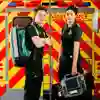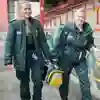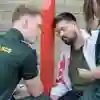




Take your first steps towards a rewarding career as a life-saving paramedic with this degree from the University of Hull.
With this hands-on course, you'll learn to treat and stabilise patients at the scene of an accident or emergency – in those crucial minutes when your knowledge and ability can be the difference between life and death.
And you'll be eligible for registration as a paramedic with the Health and Care Professions Council (HCPC) when you graduate.
About this course
This course is part of a national drive to produce better-qualified paramedics, which involves making the profession degree-only and offering paramedic science students a payment of at least £5,000 a year to support your studies.
This doesn't need to be paid back and is in addition to any financial support received through your student loan.
At Hull, you’ll learn front-line care through a combination of classroom theory and clinical practice, in line with the College of Paramedic recommendations, and you’ll be fully supported by paramedic academics, practice educators and mentors throughout your studies.
Your classroom-based learning takes place in our award-winning Allam Medical Building, which offers state-of-the-art simulated practice on campus, with placements offered with the Yorkshire Ambulance Service and other healthcare partners.
This comprehensive approach to your training gives you the confidence, skills and experience to thrive as a medical professional and become a paramedic.
Discover more about health placements - learn why they matter, explore potential destinations, and hear first-hand feedback from fellow health students.
Don’t have the qualifications you need for this course? Our part-time, flexible University Certificate in Health and Social Care Practice has no formal entry requirements - and can open the door to a career as a nurse, midwife, operating department practitioner, paramedic, or social worker.
What's the difference between life and death? You.
Module options
Each year, you’ll study modules worth a certain number of credits, and you need 120 credits per year. Most modules are 20 credits – so you’ll study six modules each year. Some longer modules, such as a dissertation, are worth more. In these cases, you’ll study fewer modules - but the number of credits will always add up to 120. Some modules are compulsory, some are optional, so you can build a course that’s right for you.
Filters
Clinical Practice Education 1
From non-technical leadership and communication skills to the practical skills associated with cardiac arrests and trauma, this module will help to prepare you for your future career.
compulsory
40 credits
Introduction to Evidence-Based Practice
You'll be discussing research, reviews and guidelines, learning how to assess each to best influence your care for patients.
compulsory
20 credits
Anatomy and Physiology
Develop your knowledge of human anatomy and physiology, exploring homeostasis whilst evolving your understanding of key systems, their interactions and interdependence.
compulsory
20 credits
Foundations of Professional Practice
Explore the wider social determinants of health and how these affect health and social care policy. Issues relating to health economics and provisions of healthcare will be discussed.
compulsory
20 credits
Applied Anatomy and Physiology
Develop a comprehensive understanding of how the human body functions under normal conditions. Armed with this knowledge, you will be equipped to conduct thorough patient assessments, make accurate diagnoses, and tailor interventions based on individual patient needs.
compulsory
20 credits
Introduction to Pre-hospital Care
With an emphasis on emergency scene management, this module instils essential skills such as quick decision-making, prioritisation, and resource management, preparing you for the unpredictable and dynamic nature of emergency situations.
compulsory
20 credits
Pathophysiology
You'll examine the pathophysiology of shock, heart failure, myocardial infarction and respiratory failure.
compulsory
20 credits
Research Methods
Prepare and complete a small action research project to develop skills that will help you across your studies. It's hands-on learning about research methodology, ethical approval, data analysis and formulating research questions.
compulsory
20 credits
Clinical Assessment and Examination for Paramedics
Developing your clinical assessment and examination skills, you'll assess and examine the cardiovascular, respiratory, neurological, gastrointestinal, musculoskeletal and endocrine systems.
compulsory
20 credits
Our facilities


Watchlist
Degrees that live up to life
Course montage
1 min
BSc Paramedic Science
Course overview
1 min
Simulating success: Paramedic Science
Course Highlight
2 mins
Training for success
Course Highlight
2 mins
Our healthcare family
Course Highlight
4 mins
Featured academics
Our staff combine teaching and clinical practice with the opportunity to be involved in high-quality research projects.
Their expertise sees them consult with regulatory bodies and government to drive improvement in healthcare and their research is recognised internationally for its quality.

Timothy Butterill
Programme Director
Tim is the Programme Director for Paramedic Science at Hull with a background in paramedic pre-hospital care, major trauma and Advanced Clinical Practice Education. Tim also teaches on several modules on the course.
Entry Requirements
What do I need?
This course is currently available through Clearing, which means our entry requirements are a bit different to what they would normally be.
At Hull, you're a name not a number. During Clearing, we look at all of your qualifications and experience, not just your academic grades. We may be able to offer you a place whatever your situation. Get started by completing our eligibility checker, and find out immediately if you could study at the University of Hull.
Have questions? Our admissions team will be happy to help.
Fees & Funding
How much is it?

Future prospects
Want to become a paramedic? This course is fully approved by the Health and Care Professions Council (HCPC) and you’ll be eligible to register with the HCPC as a paramedic when you graduate.
We work closely with the Yorkshire Ambulance Service and introduced this degree to address the shortage of fully qualified paramedics locally and nationally, so the employment prospects couldn’t be better.
Learn more about BSc Paramedic Science
Become part of the next generation of futuremakers
Like what you've seen? Then it's time to apply.
The standard way is to apply through UCAS. This will give you the chance to showcase your skills qualities and passion for the subject, as well as providing us with your academic qualifications.
Not ready to apply yet?
Visit our next Open Day, and see all that the University of Hull has to offer. Talk to our lecturers about your subject, find out what university is really like from our current students, and take a tour of our beautiful campus and amazing facilities.
You may also be interested in...
100% employability (Paramedic Science) UK domicile full-time first degree leavers; Higher Education Graduate Outcomes statistics, for the academic year 2022/23, published by the Higher Education Statistics Agency June 2025.
Available to all undergraduate students studying Nursing, Midwifery, Paramedic Science or Physiotherapy. You don't need to pay this back, and you'll get it as well as your student loan.
Paramedic Science is ranked 7th out of 43 institutions for Student Satisfaction. Complete University Guide 2026
Subjects allied to medicine: Ranked 10th in the UK for Teaching Quality. The Times and Sunday Times Good University Guide 2026.
All modules presented on this course page are subject to availability and this list may change at any time.